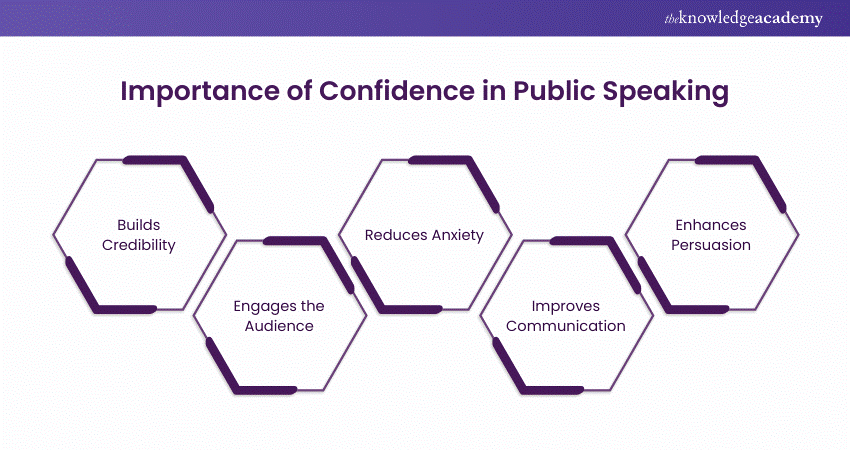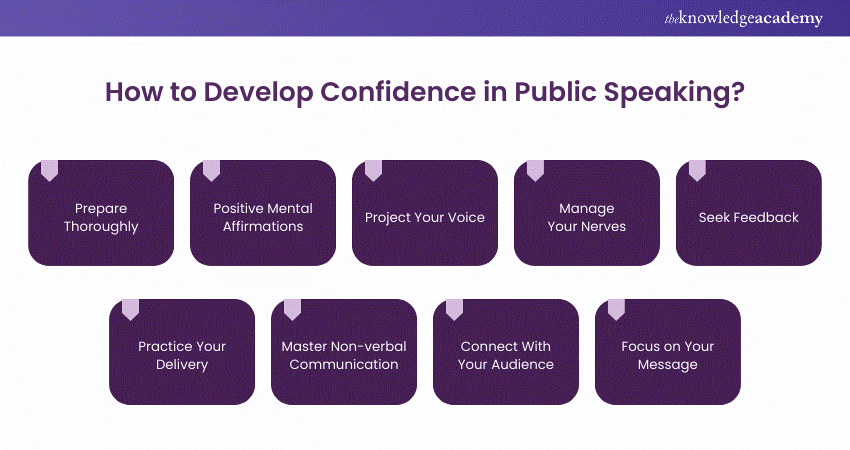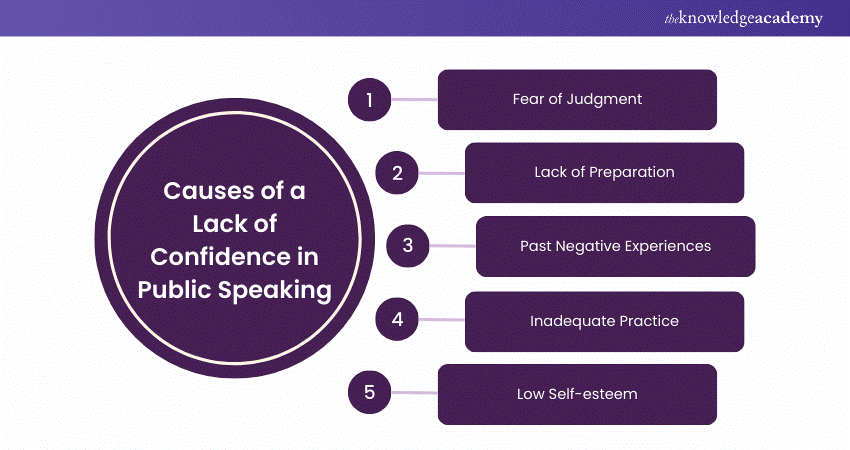We may not have the course you’re looking for. If you enquire or give us a call on + 1-866 272 8822 and speak to our training experts, we may still be able to help with your training requirements.
Training Outcomes Within Your Budget!
We ensure quality, budget-alignment, and timely delivery by our expert instructors.

The opportunity to address a large crowd can be scary and a rather daunting challenge for many. The worry of being judged or forgetting your words can torment you the night before your big speech. That is why knowing how to gain Confidence in Public Speaking can be a great way to overcome this challenge.
This blog will explain to you a few ways on how you can gain Confidence in Public Speaking with additional tips to work on your confidence. These will prove to be helpful whether you're preparing for a business presentation or a public event, or simply want to enhance your Communication Skills. Read along to build your confidence level and sweep your audience off their seats.
Table of Contents
1) Importance of Confidence in Public Speaking
2) How to Develop Confidence in Public Speaking?
a) Prepare Thoroughly
b) Positive Mental Affirmations
c) Seek Feedback
d) Master Non-verbal Communication
e) Connect With Your Audience
3) What Causes a Lack of Confidence in Public Speaking?
4) Conclusion
Importance of Confidence in Public Speaking
Confidence plays a crucial role in Public Speaking, allowing you to deliver your message effectively and connect with your audience. Here are the Benefits of Public Speaking:

a) Builds Credibility: Confidence makes you appear knowledgeable and trustworthy, which helps establish your credibility with the audience.
b) Engages the Audience: A confident speaker can capture and maintain the audience's attention, making the presentation more engaging and impactful.
c) Reduces Anxiety: Confidence helps reduce nervousness and anxiety, allowing you to focus on your message rather than your fears.
d) Improves Communication: When you are confident, you communicate more clearly and effectively, making it easier for the audience to understand your message.
e) Enhances Persuasion: A confident delivery makes your arguments more convincing, helping you to persuade your audience and achieve your goals
How to Develop Confidence in Public Speaking?
Here are some of the tips to help you improve your Confidence in Public Speaking:

1) Prepare Thoroughly
Effective Public Speaking requires meticulous preparation and organisation. Familiarise yourself with the venue by visiting the room beforehand and getting comfortable in the space.
Prepare materials by printing necessary documents at least a day before to avoid technical glitches, and make sure you have physical copies. It may be helpful to create concise cue cards to keep yourself on track and to prompt your key points. Prepare for technical issues by having backups and alternative solutions ready.
Rehearse your presentation multiple times to build familiarity and make sure you are offering a polished delivery.
2) Positive Mental Affirmations
To start building Confidence in Public Speaking, you’ll need to learn to build a positive outlook. Picture yourself on that stage, delivering your speech with confidence and perfection. Tell yourself how amazing your speech is going to be. This will help you keep a positive mindset rather than a worrying one.
3) Manage Your Nerves
The night before or the moment before you go on to address your audience, you may feel a lump in your throat or an uneasy in your stomach. Don’t worry you aren't sick your just nervous. It is important to manage this well, as it may sabotage your delivery.
Practice deep breathing exercises to calm both your heart rate and mind. Remember the affirmations you give yourself, give yourself a pep talk if you need to. It may sound silly, but it truly works wonders.
4) Seek Feedback
Once you are done with each speech, collect feedback, as it will tell you which areas you need to grow in. Often, not knowing How to Improve Public Speaking results in anxiety regarding your future endeavours. But knowing the areas to be worked on and actively working on them gives you a sense of comfort.
Seek feedback from peers and seniors in the field to gain a better understanding of your performance and progress. If you have acquired a mentor, then actively seek out their feedback on your work.
5) Master Non-verbal Communication
The easiest way to tell if a person is confident or not is to observe their non-verbal cues. Fidgety fingers or looking at the floor will not do any good. You need to work on your body language, till it screams confidence. You can do so with a few small non-verbal cues you can practice.
Standing tall with your arms free and expressive is usually a great way to show off your new confidence. Do not shy away from making eye contact and making powerful gestures. A confident stance projects authority and urges the audience to pay attention to what you have to say.
6) Connect With Your Audience
Connecting with your audience is very important as its your means of building a rapport with them. Your audience will fill a great portion of the room. Having a rapport with your audience will allow you to feel comfortable in the space you share with them. The comfort you share with your audience reflects the confidence you bring to the room.
You could do so by including elements in your speech that requires a little back and forth. Use questions that start like “Can anyone here tell me what they know about....” This prompts the audience member to participate at their own ease.
7) Using Humour
Experienced and confident public speakers often use humour in their presentations. Adding a bit of humour can make your audience laugh, creating a more relaxed atmosphere that helps you feel more at ease. However, it's important to be careful when using humour, as jokes can sometimes be misunderstood or even offend your audience.
Only use jokes if you're confident in your ability to deliver them and if they are appropriate for the situation. A safe way to use humour is by making light-hearted jokes about yourself, which tends to be more relatable and helps build trust with your audience.
Develop communication skills to build relationships with our Interpersonal Skills Training – Join today!
8) Record Videos of Yourself and Critique Them
Recording yourself while practising is a valuable tool for self-assessment. Set up a camera or use your smartphone to record your speech rehearsals. Watching the recordings allows you to identify areas for improvement in your delivery, body language, and overall presentation style. Pay attention to your tone, pace, and gestures.
Critiquing yourself helps build self-awareness and allows you to make necessary adjustments. While it may initially feel uncomfortable, it is a powerful method to refine your Public Speaking Skills and gain confidence in your ability to speak effectively. Just remember not to be too critical, as it can hamper your confidence further.
9) Have a Trial run With Family and Friends
A well-known audience might be a great way to try your material out without the worry of being judged. This provides a supportive environment in which constructive feedback can be received and gradually build confidence. Presenting to familiar faces allows you to simulate the speaking experience without the pressure of a formal setting.
Encourage your friends and family to provide honest feedback, highlighting strengths and weaknesses. Constructive criticism from those close to you can be instrumental in refining your delivery and boosting your confidence.
10) Attend Public Speaking Events and Ask Questions
Observing experienced speakers can offer valuable insights into effective Public Speaking. Attend Public Speaking events, conferences, or workshops to witness different speaking styles and techniques. Note how seasoned speakers engage their audience, manage nerves, and convey confidence.
Additionally, actively participate by asking questions during Q&A sessions. Engaging with experienced speakers and seeking advice can provide practical tips for overcoming challenges and instilling confidence in your abilities.
11) Sign up for a Public Speaking Course
If you are very passionate about Public Speaking, you should consider taking a Public Speaking Course. It would help you build the necessary skills, and being trained by a professional may do you good. Make sure to pick the right course from the right platform that you can trust.
Learning with other peers like you will also help bounce doubts off of each other. It would also help you be a part of a community of people just like you.
What Causes a Lack of Confidence in Public Speaking?
Here are the causes of a lack of Confidence in Public Speaking:

a) Fear of Judgment: Thinking about what others will think of you can make you feel insecure and anxious. This fear often leads to hesitation and self-doubt while speaking.
b) Lack of Preparation: Feeling unprepared can make you unsure about your content and delivery. This lack of readiness increases anxiety and reduces your confidence.
c) Past Negative Experiences: A previously failed presentation can create lasting self-doubt and anxiety. These memories can resurface, making you fear repeating the same mistakes.
d) Inadequate Practice: Not practising enough can leave you feeling nervous and unprepared. Practice builds familiarity and confidence, so without it, you may struggle to speak clearly.
e) Low Self-esteem: Doubting your abilities can result in a lack of confidence when speaking in front of others. This low self-worth can make it hard to believe in yourself and your message.
Learn audience engagement techniques with our Public Speaking Course – Join today!
Conclusion
Confidence is the most important pillar of Public Speaking. This blog was aimed to help you gain more Confidence in Public Speaking. It shares insight on how to be confident in Public Speaking alongside a few useful tips. Hope this blog helped you manage your nerves and build your career in Public Speaking.
Learn to articulate ideas with our Effective Communication Skills Course – Join today!
Frequently Asked Questions

Developing Public Speaking skills fosters personal growth by enhancing communication, boosting self-confidence, and refining critical thinking. It promotes articulation and persuasiveness, which are essential for success in various aspects of life.

The biggest mistake one can make in Public Speaking is not preparing enough! Reading from the notes or slides while presenting may make you seem underprepared, so you should avoid that too. Other mistakes include speaking too quickly, not engaging the audience, and using language that goes above the audience's head.

The Knowledge Academy takes global learning to new heights, offering over 30,000 online courses across 490+ locations in 220 countries. This expansive reach ensures accessibility and convenience for learners worldwide.
Alongside our diverse Online Course Catalogue, encompassing 19 major categories, we go the extra mile by providing a plethora of free educational Online Resources like News updates, Blogs, videos, webinars, and Interview Questions. Tailoring learning experiences further, professionals can maximise value with customisable Course Bundles of TKA.

The Knowledge Academy’s Knowledge Pass, a prepaid voucher, adds another layer of flexibility, allowing course bookings over a 12-month period. Join us on a journey where education knows no bounds.

The Knowledge Academy offers various Communication Skills Courses including Assertiveness Skills Training, Public Speaking Course etc. These courses cater to different skill levels by providing comprehensive insights into Types of Communication Skills.
Our Business Skills Blogs cover a range of topics related to Communication Skills offering valuable resources, best practices, and industry insights. Whether you are a beginner or looking to advance your Communication skills, The Knowledge Academy's diverse courses and informative blogs have you covered.
Upcoming Business Skills Resources Batches & Dates
Date
 Public Speaking Course
Public Speaking Course
Fri 17th Jan 2025
Fri 21st Feb 2025
Fri 4th Apr 2025
Fri 6th Jun 2025
Fri 19th Sep 2025
Fri 26th Dec 2025







 Top Rated Course
Top Rated Course



 If you wish to make any changes to your course, please
If you wish to make any changes to your course, please


